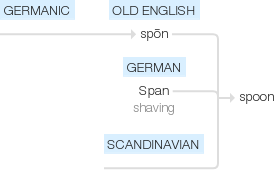Spoon
Old English spōn ‘chip of wood’, of Germanic origin; related to German Span ‘shaving’. spoon (sense 1 of the noun) is of Scandinavian origin. The verb dates from the early 18th century.
wiktionary
From Middle English spoon, spoune, spone, spon(“spoon, chip of wood”), from Old English spōn(“sliver, chip of wood, shaving”), from Proto-West Germanic *spānu, from Proto-Germanic *spēnuz(“chip, flake, shaving”), from Proto-Indo-European *(s)peh₂-(“chip, shaving, log, length of wood”).
Cognate with Scots spun, spon(“spoon, shingle”), West Frisian spoen, Dutch spaan(“chip, flinders”), German Span(“chip, flake, shaving”), Faroese spónur(“wood chip; spoon”), Ancient Greek σφήν(sphḗn, “wedge”). Eclipsed non-native Middle English cuculer and coclear(“spoon”) both ultimately borrowed from the Latin.
The "unit of energy" semse was coined by writer, speaker and lupus patient advocate Christine Miserandino in 2003.
Origin uncertain. Compare spoom.
etymonline
spoon (n.)
Old English spon "chip, sliver, shaving, splinter of wood," from Proto-Germanic *spe-nu- (source also of Old Norse spann, sponn "chip, splinter," Swedish spån "a wooden spoon," Old Frisian spon, Middle Dutch spaen, Dutch spaan, Old High German span, German Span "chip, splinter"), from PIE *spe- (2) "long, flat piece of wood" (source also of Greek spathe "spade," also possibly Greek sphen "wedge").
As the word for a type of eating utensil, c. 1300 in English (in Old English such a thing might be a metesticca), in this sense supposed to be from Old Norse sponn, which meant "spoon" as well as "chip, tile." The "eating utensil" sense is specific to Middle English and Scandinavian, though Middle Low German spon also meant "wooden spatula." To be born with a silver spoon in one's mouth is from at least 1719 (Goldsmith, 1765, has: "one man is born with a silver spoon in his mouth, and another with a wooden ladle").
spoon (v.)
1715, "to dish out with a spoon," from spoon (n.). The meaning "court, flirt sentimentally" is first recorded 1831, a back-formation from spoony (adj.) "soft, silly, weak-minded, foolishly sentimental." Related: Spooned; spooning.
